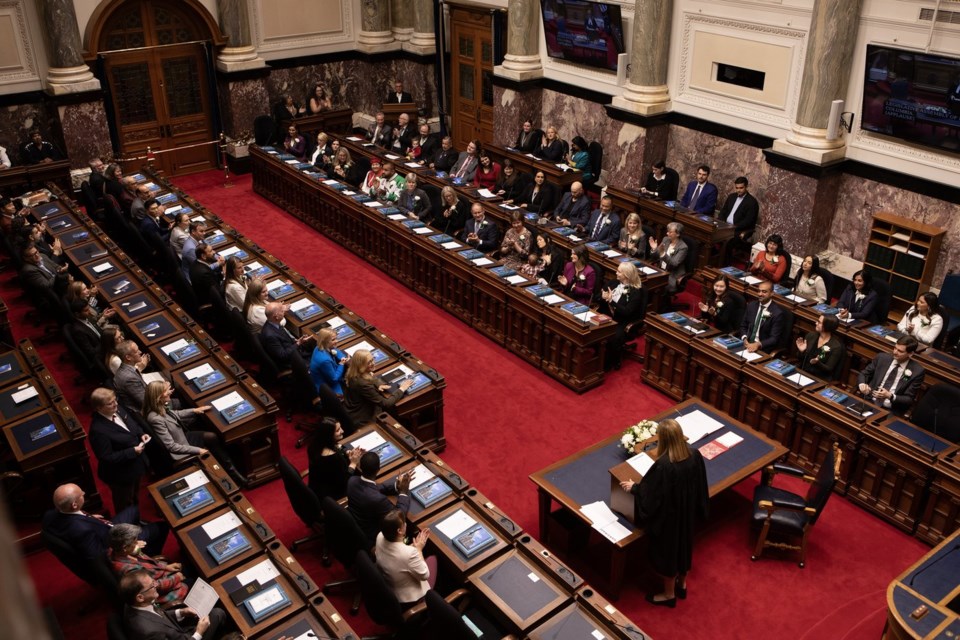VICTORIA — British Columbia's government has depicted the province on a battle footing against the threat of U.S. tariffs, as it faces its “most consequential time” since the Second World War.
The NDP government's agenda, outlined in a throne speech delivered by Lt.-Gov. Wendy Cocchia on Tuesday, evoked wartime imagery with references to Winston Churchill, D-Day and the fight against Nazism.
"The historic bond between Canada and the United States has been strained in profound ways," she said, adding that "trust has been broken and will not easily be repaired."
"No matter what the future has in store, one thing has been made clear: We will not leave our future success to the whims of unpredictable forces from beyond our borders,” Cocchia said.
The opening of the legislative session came amid ongoing threats from the U.S. administration of President Donald Trump to impose sweeping tariffs on Canadian imports, and his repeated assertions that Canada should become the 51st state.
Cocchia said in the speech on behalf of the government of Premier David Eby that a "tariff war" with the U.S. would be devastating to families on both sides of the border but the province must fight back "firmly and forcefully if required."
"This is not a fight we started. This is not a fight we want. But we won’t ever roll over or let our guard down," Cocchia said.
The speech said British Columbians had been put on a "roller-coaster ride" by the White House for the past four weeks, and they must prepare for it to continue for the next four years.
It said the government was responding with a three-part strategy: to strengthen and grow the economy, diversify trade relationships and respond to American threats.
All ministers had been instructed to speed up permit approvals to get projects built that will create jobs, the speech stated.
It said the government would expand and strengthen business relationships with Asia, Europe and beyond, while upgrading infrastructure and improving supply chains to keep B.C. "competitive on the world stage and reach new markets efficiently."
It also said the government would break down interprovincial trade barriers.
"The bottom line is this: It should not be easier to buy and sell with Washington state than with our Canadian friends and neighbours," the speech said.
Ahead of the speech, Colin Hansen, a former finance minister in the BC Liberal government and a member of the legislature from 1996 to 2013, said now should be a time for politicians to "park" partisanship.
Hansen said in a phone interview on Monday that the magnitude of the potential impact of Trump's administration on B.C. meant that members of the legislature needed to put aside their differences and work together.
Last week, Opposition Leader John Rustad said key issues for his members during this session would be fentanyl, the borders and "what's going on with Trump.”
He has also said that had the Conservatives won the B.C. election, he would have been in Washington back in November.
Rustad's upstart Conservatives came within a whisker of defeating the NDP, which holds 47 seats and clung to power with a one-seat majority. The Conservatives hold 44 seats, while the BC Greens elected two members who have agreed to support the NDP on confidence votes.
Trump's tariff threat and the uncertainty emerging from south of the border have already upended the NDP's agenda, cited last week in the cancellation of a $1,000 grocery rebate that had been a flagship promise in last year's provincial election.
Finance Minister Brenda Bailey also said Thursday that the government would have to "revisit" its election vow for a middle-income tax cut in future budgets at a time that B.C. faces an "unpredictable" future.
The throne speech began with tributes to departed figures, including Eby's predecessor as premier, John Horgan, who died of cancer in November, and former prime minister Brian Mulroney, who died last February.
At its conclusion, there was also a personal nod from Cocchia to the many new members of the legislature, as she delivered her first throne speech to an audience filled with freshmen MLAs.
But it was dominated in between by talk of war and patriotism. Even the references to the previous happier relationship with the U.S. was couched in terms of a "bond forged in battle."
"We stormed the beaches at Normandy together on D-Day, fighting to liberate Europe from fascism. For generations, our soldiers have died, cried and celebrated victory beside each other," it said.
It added that there remained "much we admire about our southern neighbour. "
"But we will never become the 51st state," the speech said.
This report by The Canadian Press was first published Feb. 18, 2025.
Marcy Nicholson, The Canadian Press



